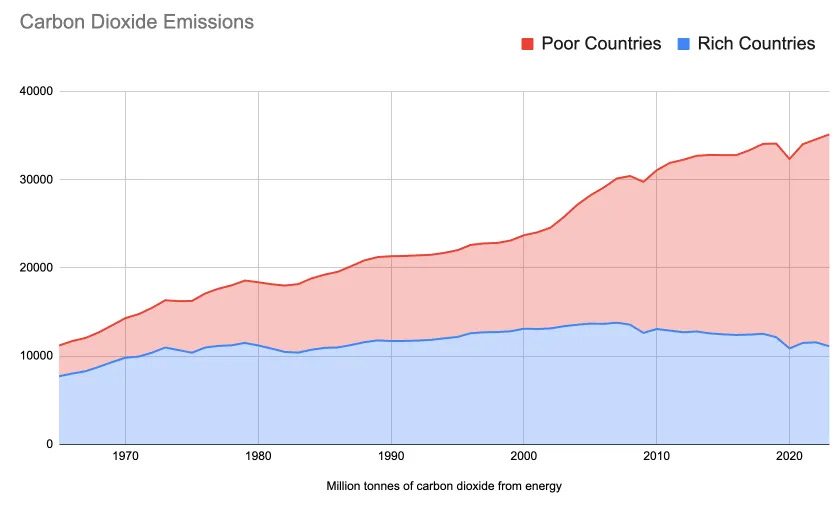“Think Global, Act Local” won't work
Looking for climate solutions in all the wrong places
There’s this old, not-very-funny joke about a drunk rooting around beneath the streetlamp outside a bar. A guy walking by sees him and asks “what you looking for?” The drunk slurs back “my keysh”
“Oh,” the passerby says “you dropped them here?”
Then the drunk says “nah, I dropped them behind the bar, but there’s no streetlamp back there…”
It’s not funny, I know.
But it’s the image that keeps coming to mind when I read what passes for climate journalism these days.
I’m thinking of stories like “Vermont bill wants to charge big oil for climate damage” and “Pfizer announces commitment to accelerate climate action” and “Spain Approves Its First Climate Change Law: At Least 74% Renewable Electricity Production By 2030” and “EVs are just going to win.”
There are hundreds upon hundreds of these kinds of stories. New ones come out every day.
Stories of first world politicians, activists, legislators, PR flaks and pundits looking for climate keys underneath the rich world streetlamp.
Stories of people taking the old slogan — “think global, act local” to heart and taking action to combat climate change in the spaces where they can do something.
Where their agency lies.
I sympathize with them. I really do. It’s important we find those keys. Vital! The impulse to go out and do something about the climate is laudable. The thing is, the keys…they’re just not there.
They’re back behind the bar, in the poor countries, where first world climate activists, pundits and politicians have no agency.
What’s behind the bar, exactly?
Six billion poor people, each emitting miniscule amounts of greenhouse gasses, and determined to improve their lives in ways that inevitably mean emitting quite a lot more.
I sympathize with them, too!
I grew up in a poor country, and while I wasn’t poor, I saw poverty up close.
I know that preaching degrowth in poor countries is an obsenity: cruel in the kind of insouciant way only the utterly clueless can countenance.
People in poor countries overcome poverty isn’t just legitimate, it’s morally urgent.
And to the extent that they succeed, their emissions will grow.
Nothing that happens under the streetlamp will affect that.
Vermont’s legislators can’t nudge it, Pfizer’s press flaks can do nothing about it, Spain’s politicians are utterly powerless to stop it, everybody in the developed world can dump their old ICE car for an EV tomorrow and it wouldn’t move that needle.
The trends driving the climate crisis are all back behind the bar. In a developing world whose needs and aspirations are simply not part of the first world climate conversation. In a poor world that accounts for twice as much greenhouse gas as the rich world, with much room to grow.
This, really, is why I’m so interested in outside-the-box climate repair ideas. Because there really is no point redoubling our efforts on an impossible strategy. Because the climate conversation under the first world streetlight is exhausting and pointless.
Telling the drunk to just look harder under that streetlamp is cruel. It’s going to exhaust him. It will do nothing to solve the problem. What the drunk needs is a flashlight so he can go look for his keys where they actually are: back behind the bar.
Climate change is a global issue. The atmosphere doesn’t care where emissions come from, it heats just the same. Fixating on the emissions you feel somehow connected with —because they come from your company, your state, your country, your car, your patch — tells me more about your psychological needs than about the climate’s needs. If we can’t cause emissions to fall globally —and we can’t— there’s very little to be gained from fixating harder on the emissions you’re personally responsible for.
Almost all of what passes for a climate conversation in the discourse is really no such thing. It’s aimed at meeting first world people’s need to feel in control. It addresses their personal psychological needs, their political needs, their companies’ marketing needs.
None of that has very much to do with the climate as such.
A proper climate conversation would be one that looks at the actual drivers of climate change.
We’re not having that conversation. Which is ironic, considering how much we talk about climate.




I think the analogy could be extended a bit- the drunk looking for his keys has a 50 billion dollar NGO budget and he has hired an army of consultants and built a gigantic array of very expensive high powered microscopes to search under the street light. All involved are convinced that finding the key will take just a little more effort. None of them can fathom that getting paid to keep searching in the same place could be part of the problem…
Sadly, the few places I do tend to see the 3rd world issue acknowledged seriously are almost exclusively by the disturbing anti-natalist types who are 100% on board with the idea that the fastest way to reduce emissions is to reduce population. They seem pretty comfortable filing dying of heat, dying of cold, dying of famine, etc under "natural causes" rather than "genocide", even if it's their policies driving up the death toll.